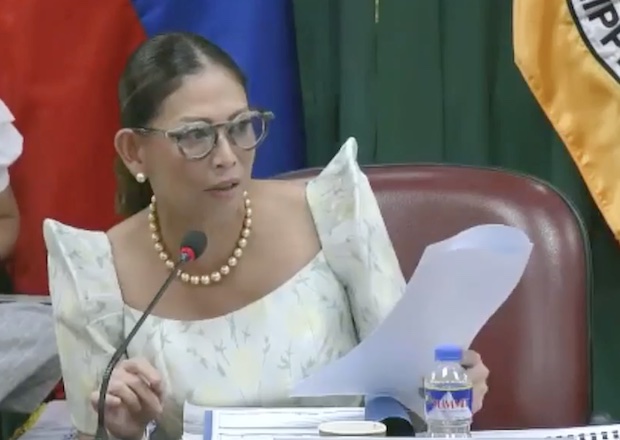
Marikina Rep. Stella Quimbo asks questions about the proposed 2024 budget of the DHSUD during the hearing on Tuesday, Aug. 29, 2023. (Photo from a video posted on the Facebook page of the House of Representatives)
MANILA, Philippines — Socialized housing projects could be costly and the government might find it hard to collect dues from beneficiaries.
Marikina 2nd District Rep. Stella Quimbo raised those concerns on Tuesday during the House Committee on Appropriations hearing on the proposed P3.283 billion budget for 2024 of the Department of Human Settlements and Urban Development (DHSUD).
Quimbo, who is a senior vice chair of the committee, asked how many households would be covered by the P1.5 billion subsidy — that is, the amount the government would shoulder.
That amount would only provide shelter for 50,000 households, assuming that a single housing unit would cost P1.2 million, Human Settlements Undersecretary Robert Juanchito Dispo said.
“The reason for my asking is because P1.5 billion is a big amount. That means, for 30 years, we will have to pay P1.5 billion. And on top of that, if we will add for the next year another 50,000 [households], [that’s] P1.5 billion plus another P 1.5 billion, and so on and so forth. And let’s remember, the target [for the entire six-year term of President Ferdinand Marcos Jr.] is six million [housing units]. So according to your projections, what is the maximum amount that the government will pay? How many billions?” Quimbo said, speaking partly in Filipino.
Dispo said it would be around P36 billion worth of interest rate subsidies for one million housing units.
“Our assumption, Madam Chair, is P 36 billion per year ang interest rate subsidy, representing one million housing units,” Dispo said.
According to him, the DHSUD is already studying the possibility of interest rates being eventually shouldered by housing beneficiaries based on the expectation that salaries would improve over time.
But Quimbo reminded DHSUD of another problem: Local governments have found it difficult to collect fees from beneficiaries of subsidized housing programs.
“We have studied that the interest rate subsidy would not run for the next 30 years on the assumption that the beneficiaries will improve their lives with an increase in salary, increase in the value of the property, so may waning away period […] Internally, we have an internal study that 10 years would be the maximum that the interest rate subsidy program will run,” Dispo said.
“Okay, let’s just study this because the concern is that if the government subsidizes [a project] it’s usually hard to collect. That’s the reality. So have you thought about alternatives?” Quimbo said.
She also suggested that instead of subsidizing the interest, the funds could be loaned to the Home Development Mutual Fund (better known as the Pag-IBIG fund), which would then lease it to housing loan applicants.
“So can we do this. This is an alternative. Maybe it can be studied. Can we use the subsidy so that Pag-IBIG can take a loan? Right now Pag-IBIG can give loans at three percent, right? Which actually is already a subsidized rate, because six percent is the usual, three percent is subsidized,” Quimbo said.
“So we really need funds for the private sector. So is it possible to give a loan to Pag-IBIG, from the private sector, and the interest subsidy will be used to fund that.”
During the deliberation, which took over six hours, lawmakers and the DHSUD representatives, discussed the government’s ambitious housing program — including complaints that amortization rates of P3,500 to P4,500 were too big for low-income earners.
According to ACT Teachers party-list Rep. France Castro, minimum wage earners — even those in Metro Manila who get a bigger P610 per day salary — cannot afford this rate.
However, Secretary Jose Rizalino “Jerry” Acuzar said that the high housing cost would be the price to pay for in-city relocation, which urban poor groups and informal settlers prefer.